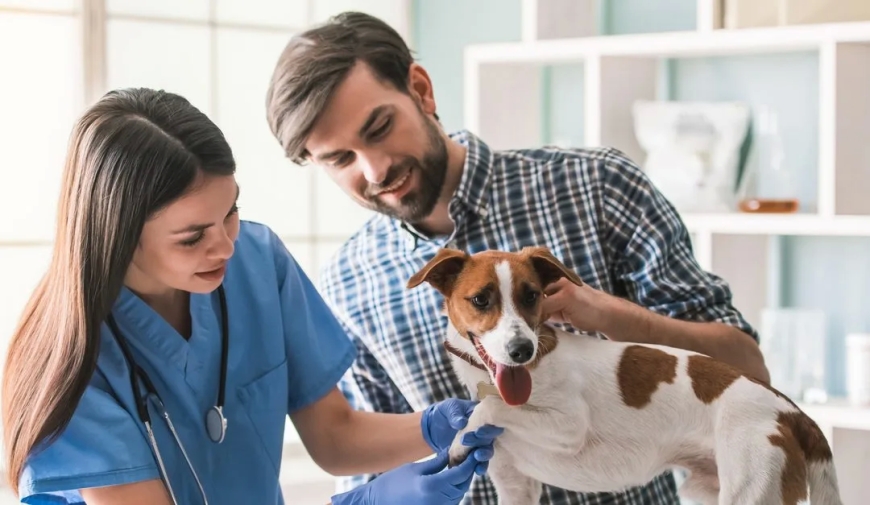Signs Your Pet Needs Emergency Care: Recognizing Critical Health Issues
Pets are always loved members of the family. When disaster strikes, they require immediate action.

As a pet owner, one might always be wondering when an injury or health problem requires immediate medical attention and when it can wait for regular vet office hours. It may be the difference between life and death for your pet to know when to take your furry friend to an emergency vet. Certain medical conditions of pets progress fast, making it life-threatening after only a little time has elapsed.
Here is a step-by-step guide on how to identify critical health issues and symptoms that indicate your pet needs emergency care.
1. Trouble Breathing or Rapid Breathing
If your pet can't breathe, this is an important symptom that indicates urgent action is needed. Watch for these symptoms:
-
Rapid or shallow breathing
-
Gasping for air or open-mouth breathing (this is particularly concerning in cats)
-
Excessive panting that doesn't subside even after resting
-
Bluish or pale gums, tongue, or inside of the ears
-
Wheezing or coughing
Difficulty breathing can indicate conditions such as asthma, pneumonia, heart disease, or even trauma. If your pet is displaying these signs, get emergency help right away.
2. Severe Vomiting or Diarrhea
Although the occasional vomiting or diarrhea might not be a concern, repeated or severe episodes may result in dehydration and point to a serious underlying problem. Emergency help is required if:
-
Vomiting or diarrhea lasts more than 24 hours
-
There's blood in the vomit or stool
-
Your pet acts lethargic or weak
-
Your pet is showing indicators of dehydration, such as dried gums or sunken eyes.
Symptoms may indicate poisoning, some type of gastrointestinal obstruction, as well as viral infections caused by parvovirus that need immediate medical help.
3. Excessive Bleeding or Wounds That Won't Stop Bleeding
External bleeding may result from injury, cuts, or other causes such as tumors or diseases. If the bleeding does not cease after applying pressure for a few minutes or appears uncontrollable, it is essential to get your pet to an emergency vet.
-
Any large wound, deep cut, or tear in the skin
-
Severe bleeding that doesn't subside
-
Bleeding from the mouth, nose, or rectum
-
Uncontrolled bleeding can result in shock, and if not addressed, it can be fatal.
4. Seizures or Convulsions
Seizures are serious and can be induced by many causes, such as toxins, neurological disorders, or even head trauma. If your pet has a seizure that lasts for more than a few minutes, or if they have had several seizures in succession, then emergency care is called for.
-
Loss of consciousness
-
Involuntary shaking or tremors
-
Drooling or frothing at the mouth
-
Confusion or disorientation after the seizure
This can be a sign of neurological or metabolic disorders and should be treated promptly to limit further damage.
5. Sudden or Severe Lameness
If your pet suddenly refuses to move or limps severely, it might be an indication of some kind of injury or, even worse, such as a ligament rupture or bone fracture. Even if your pet appears to recover after resting, take them in for a checkup if:
-
They cannot put weight on one or more legs
-
They seem to be in significant pain and are not responsive to touch
-
You suspect a fracture, dislocation, or internal injury
These symptoms require prompt care to avoid permanent damage or complications.
6. Inability to Urinate or Defecate
A pet that cannot urinate or pass stools is an emergency. If your dog or cat is straining to urinate or pass stool or is unable to do either, they could have a blockage in the urinary tract or intestines that may lead to such severe complications as kidney failure or rupture of the bladder.
-
Straining with little or no output
-
Crying or screaming as the pet tries to urinate or defecate
-
Blood-tinged or cloudy urine
-
Abrupt onset of soiling the house
This can go to the red flag in a split second and be life-threatening unless addressed immediately.
7. Drooling or Excessive Salivation.
Pets drool when there is something wrong with their condition, especially if sudden drooling is seen and or happens after eating or drinking. Severe drooling has various possible causes, including:
-
Poisoning or toxicity (from food, plants, or chemicals)
-
Foreign objects stuck in the mouth or throat
-
Oral infections or injury
-
Nausea or gastric upset
If your pet is drooling excessively and you’re unsure of the cause, contact an emergency vet right away.
8. Abdominal Distension or Pain
If the abdomen of your pet has become bloated or sensitive to the touch, it might be a serious condition, like bloat, which is a gastric dilatation-volvulus that is commonly found in large dogs. It might also be a case of a gastrointestinal obstruction. Common symptoms to look for are:
-
Visibly bloated abdomen
-
Sensitive or painful abdomen-your pet may whimper or growl when touched
-
Rapid breathing or excessive panting
-
Restlessness or pacing
Abdominal bloating or pain can be a sign of twisting or blockage of the stomach or intestines, which must be treated immediately by your veterinarian.
9. Collapse or Sudden Weakness
If your pet suddenly collapses or becomes weak, this could be a sign that your pet is in shock or suffering from a serious underlying disease such as heart failure, internal bleeding, or severe infection.
-
Fainting or unresponsiveness
-
Uncoordinated movement or stumbling
-
Cold limbs, shallow breathing, or rapid heart rate
This is an emergency that should be treated immediately to stabilize your pet and prevent further complications.
10. Changes in Behavior or Mental Status
Changes in behavior or mental status can be a sign of a medical emergency. Symptoms such as confusion, lethargy, aggression, or disorientation are signs that something is wrong.
-
Uncharacteristic aggression or irritability
-
Excessive lethargy, hiding, or acting unusually anxious
-
Disorientation, loss of coordination, or unsteady walking
These conditions can be due to neurological issues, infection, or toxicity. They should see a doctor right away to eliminate the cause.
Conclusion
Pets are always loved members of the family. When disaster strikes, they require immediate action. Being aware of when your pet needs emergency attention makes all the difference between receiving prompt care. If your pet is showing some of the symptoms mentioned, don't wait to call them. Instead, rush your pet to an emergency veterinary clinic immediately. The sooner, the better for your pet to live their best, healthiest life by your side.
What's Your Reaction?






















